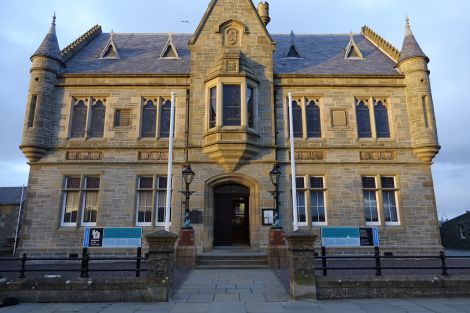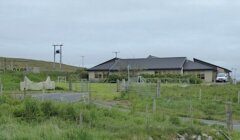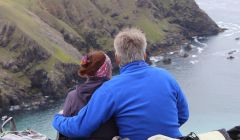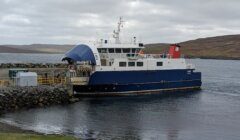Council / SIC to explore ways of achieving self-determination after elected members back motion
SHETLAND Islands Council is set to begin exploring options for achieving “financial and political self-determination” after a motion was approved by elected members.
The significant moment in the council chamber on Wednesday saw the vast majority of Shetland’s 22 councillors show their support for the motion during a meeting of the full council.
It went to a vote after Stephen Leask proposed an amendment against the motion, with only Ian Scott backing him.
Westside member Catherine Hughson and Lerwick South councillor Cecil Smith were not present during the vote, with the total tally 18-2 in favour of the motion.
The motion had originally been signed by nine councillors, including leader Steven Coutts and convener Malcolm Bell.
It stemmed from growing frustration over what they saw as more decision making being centralised, and reduced government funding.
Councillors were keen to stress that the motion meant options were only being explored, and that any constitutional change would see the public go to the ballot box.
The motion read: “We believe that Shetland has the wherewithal to have a positive future.
“However, in recent times we have seen more and more decision making being centralised and public funding being consistently reduced.
“We are concerned that this ongoing situation is seriously threatening the prosperity, and even basic sustainability, of Shetland as a community.
“In order to look at alternatives to ensure Shetland can reach and maintain its full potential, we, the undersigned, move that: “The Shetland Islands Council formally begins exploring options for achieving financial and political self-determination.”
Councillors Duncan Anderson, Andrea Manson and Alec Priest have been a driving force behind the motion, which has been in the pipeline for a number of months.
Leader Coutts proposed for the motion to be approved, suggesting that remote decision making “just does not work” for Shetland.
Become a member of Shetland News
He referred to his belief that the creation of the Scottish Parliament in the 1990s and the more recent islands act have not had much of a beneficial impact on Shetland.
Coutts also pointed to former MSP Tavish Scott’s successful move to get Shetland taken ‘out of the box’ on official maps.
“Ironically the situation has declined since we moved out of the Moray Firth,” he said.
He said there were a number of opportunities for Shetland in the years ahead, such as the proposed space centre and its potential “significant role” in energy transition.
“There’s a host of opportunities around Shetland and we need to grasp them,” Coutts said.
Anderson, meanwhile, said that he was “delighted” to see the motion come forward.
“Carrying on with the status quo is not an option,” he said.
Lerwick councillor Leask, however, was not so keen on the idea, saying it was “not the time or place” to be what he called “autonomy lite”.
He said he felt the issue should not be restricted to 22 councillors, saying the Shetland public should be consulted and that the issue needed to be taken to the ballot box.
“I believe in democracy, not dictatorship,” he said.
Fellow Lerwick member John Fraser, however, noted the wording of the motion, highlighting that it would only see the council explore options as a first step.
“Any change that arises will be decided by the ballot box,” he said.
North Isles member Ryan Thomson said there were a number of “myths” surrounding the motion.
“Can anyone say we have not witnessed a complete erosion of local democracy since devolution?” he added.
Thomson raised the issue of the Scottish Government’s level of funding for internal ferries, which has repeatedly fallen short of the SIC’s full ask.
He said things were now at a “crossroads”.
Despite the Scottish Government’s criticism, the council’s sole party representative – the SNP’s Robbie McGregor – said he would support the motion.
His one plea was for all options to be considered.
He said he would support the motion as long it is not a “back door” way of getting “us into a relationship with what’s left of the UK after the Scottish independence referendum”.
“It’s up to the Shetland people to articulate what they want,” McGregor added.
Ian Scott said he believed there was not an appetite in Shetland for more power.
“It’s not just only what is being said in the motion…it’s who is saying it,” the central member said.
He alleged that those behind the motion were likely to have “voted for austerity” past elections by supporting the Liberal Democrats.
This comment was later criticised by both Coutts and southend councillor George Smith.
He also claimed that “wealthy fishermen and liberals who do not like to see Scotland independent” were behind the movement.
Scott said he believed council officers would be wasting their time on “political adventurism”.
On a more upbeat tone, deputy leader Emma Macdonald said the council should be looking at creating a positive outcome for the years ahead.
“Young folk are the future of Shetland,” she said, supporting the motion.
George Smith added that he felt the Shetland Partnership Plan could be a key focus, and the isles as a whole.
“This is not about Shetland Islands Council,” he said. “This is about Shetland moving forward.”
Commenting on the subject of council officers’ time, Lerwick member Peter Campbell said there was plenty of local expertise which could be tapped into.
Lerwick councillor Amanda Hawick, meanwhile, said she was initially on the fence as to which way to vote.
While she said she supported more power for local decision-making, Hawick also said she was unsure about the timing of the motion – with council staff time already strained by Covid-19 and Brexit.
North mainland’s Alastair Cooper said “Shetland has never really been all that comfortable with the status quo” and added that the motion could be a “catalyst” for discussion on the issue.
Davie Sandison noted that Shetland was a net contributor to Scotland, and with greater powers there could be more opportunity to raise finances.
He added that places like Shetland could often be forgotten about if they do not speak up.
“Sometimes we are not shouting loudly enough because we are too meek,” Sandison said.
He also warned that the motion was being “conflated with autonomy” – something which he said was not the only option.
South mainland member Allison Duncan said he supported the motion, but warned that the SIC had to get its own finances in order first.
Stephen Flaws, who represents Lerwick South, said he “wholeheartedly” thought that the motion was worth looking into.
Central member Moraig Lyall, meanwhile, said she wants to “break down barriers, not create new ones” – but said she supported exploring the options.
North Isles member Alec Priest said: “I believe devolution was never meant to stop at Holyrood”.
He said “we would be doing Shetland a great disservice” if all the options were not looked at.
North mainland’s Andrea Manson also referred to the issue of depopulation in her show of support for the motion.
Referring to questions over timing, meanwhile, Anderson said “we can never have a perfect time”.
Summing up in opposition to the motion, Leask said that the Our Islands Our Future initiative formed after the 2014 Scottish independence referendum should instead be properly explored.
He said the motion was just “reinventing the wheel”.
Referring to the funding per head of population from the government, Leask said: “When we speak about funding from the Scottish Government we actually do quite well”.
On the other side, Coutts said the time was right to explore all options.
“I’m not going to look 25 years into the past or the future,” he said. “I’m going to concentrate on the now.”
With things going to a vote, the council chamber overwhelmingly voted in favour of the motion.
Commenting on the vote, Highlands and Islands Conservative MSP Jamie Halcro Johnston said:
“It’s clear that there has been a growing frustration in Shetland, and across Scotland’s islands communities, that the Scottish Government neither understands nor cares for their particular needs. Nicola Sturgeon only shows up when there is an election on and the positive words around the Islands Act have too often not been reflected in actions.
“Over 13 years of SNP Government in Edinburgh, countless promises have been made to our island communities but few are ever delivered. It’s no wonder islanders have run out of patience.
“Shetland’s geography and history have made it a distinct community within Scotland and the UK. I hope that a positive discussion can be had on the future of the islands, and Scotland’s other island communities as well.
“I believe it’s right that both of our governments work with the islands to help meet the aspirations and unique needs of their people. However it is clear that the current arrangements, where so much power is centralised in Edinburgh and the needs of Shetland often ignored, is some distance from where Shetlanders want to be.”
Become a member of Shetland News
Shetland News is asking its many readers to consider paying for membership to get additional features and services: -
- Remove non-local ads;
- Bookmark posts to read later;
- Exclusive curated weekly newsletter;
- Hide membership messages;
- Comments open for discussion.
If you appreciate what we do and feel strongly about impartial local journalism, then please become a member of Shetland News by either making a single payment, or setting up a monthly, quarterly or yearly subscription.















































































